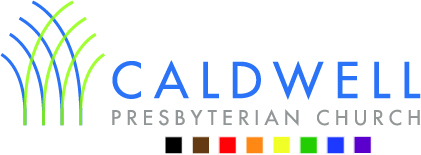PLEASE TAKE TIME TO READ THE FOLLOWING IMPORTANT LETTER FROM THE SESSION
Dear Caldwell,
On June 28, 2020, Pastor John raised a serious matter for the congregation to consider. For years, some of us have known that the Caldwell family, which was memorialized through the name of our church, earned its wealth with the unpaid labor of enslaved Black people. It is difficult to reconcile that past history with our current congregation’s concern for social justice. Many of the inequities that have resulted in present day injustice have their roots in slavery and the systemic racism that has followed from that time to now.
Our affordable housing project is named after Easter, the name of one of the people enslaved by the Caldwell family. While this is a significant gesture, is it enough?
After John’s sermon, a number of Caldwell’s members expressed various opinions about the possibility of changing the name of our church. A change in the name of a Presbyterian Church is not a simple proposition. It must be approved by the congregation before any other legal actions can be taken. The Session recently discussed whether to create a process that would formally gather the input of the congregation, make recommendations and ultimately solicit a decision from our members. At the conclusion of our discussion, the session decided that consideration of a possible church name change was far too important to rush.
Caldwell is on a journey toward becoming an anti-racist church. We should all have the opportunity to learn more about what that means. We invite each of you to take that journey alongside your Session and church staff. We have gathered some resources to provide a common base of understanding. We hope that you would take advantage of them.
Before talking about racism, it will be helpful to begin with several articles that address the significance and considerations around changing the name of a church. Please note: These are not denomination-specific, nor were they all written recently. They are offered as examples of some of the things we might want to contemplate.
- Dare You Change the Church’s Name? https://www.christianitytoday.com/pastors/1987/fall/87l4040.html
- Re-naming your church is a monumental move. It’s not something to consider lightly. As you consider your new name, remember that it will be the most public reflection of your church’s identity deep into the future. https://tonymorganlive.com/2018/11/19/6-critical-questions-church-name-change/
- The decision to change the name of a church is no small issue, but it could lead to enormous positive impact. https://www.efca.org/blog/church-leadership/church-name-change
- 10 Questions to Ask Before You Change the Name of Your Church https://www.vanderbloemen.com/blog/change-church-name
Next, is a link to a report on the Caldwell family history, written by former member Beth Van Gorp following Caldwell’s centennial anniversary in 2012. Beth’s report shed light on a shameful history that made many of us feel less comfortable sitting in a sanctuary that came at the cost of blood, sweat and tears shed by enslaved children of God.
For those who missed it, or want to hear it again, here is a link to Caldwell’s worship service on 6-28-2020. About 43 minutes in, John addresses that legacy of exploitation and abuse, especially at a time when present day injustices are being revealed to all through the lenses of cell phone cameras. The cameras shine a bright light on problems that have existed for generations.
And finally, here are several passages of scripture, addressing our beliefs as Christians and the actions to which our beliefs call us. We invite you to reflect and pray on these scriptures with this journey in mind:
As we take the journey toward anti-racism, each of us should have a solid understanding of the history of racism and the many forms that it takes. One has to recognize an enemy before it can be defeated.
Beginning on September 8th, we hope that each of you will accept a 21-Day Racial Equity Challenge to establish the habit of acquiring knowledge and perspective regarding racism and anti-racism. The 21-day challenge was created by Dr. Eddie Moore Jr. He has collected articles, videos and podcasts, many of which will only require a few minutes of your time each day. There are also books on the list that delve into the subject more extensively. You can start reading the books right away if you wish. Regardless of which materials you select, there will be opportunities to share your responses and insights with other members of your Caldwell family.
The 21-day Racial Equity Challenge is only the starting point for very long journey. Soon, our church’s website will house a collection of resources related to racism and other social justice issues that are important to our congregation, our community and our nation. Stay tuned for more information about this. You are all invited to contribute recommendations for additions to this living library as you become aware of other particularly helpful resources and materials.
The congregation is the church. We decide what is important to us and how we want to be known. We will address these matters thoughtfully and collectively. The name of our church will be considered in due time. Meanwhile, let us use this time apart to learn and grow together.
In Christ,
The Session
Judith Ard, Doreen Byrd, Abong Fankam, Richard Harrison, Meg Haynes, Helen Hull, Heather Newgreen, Eric Overcash, Nancy Pugh, Wayne Russell, Linda Schick, Scott Walls
